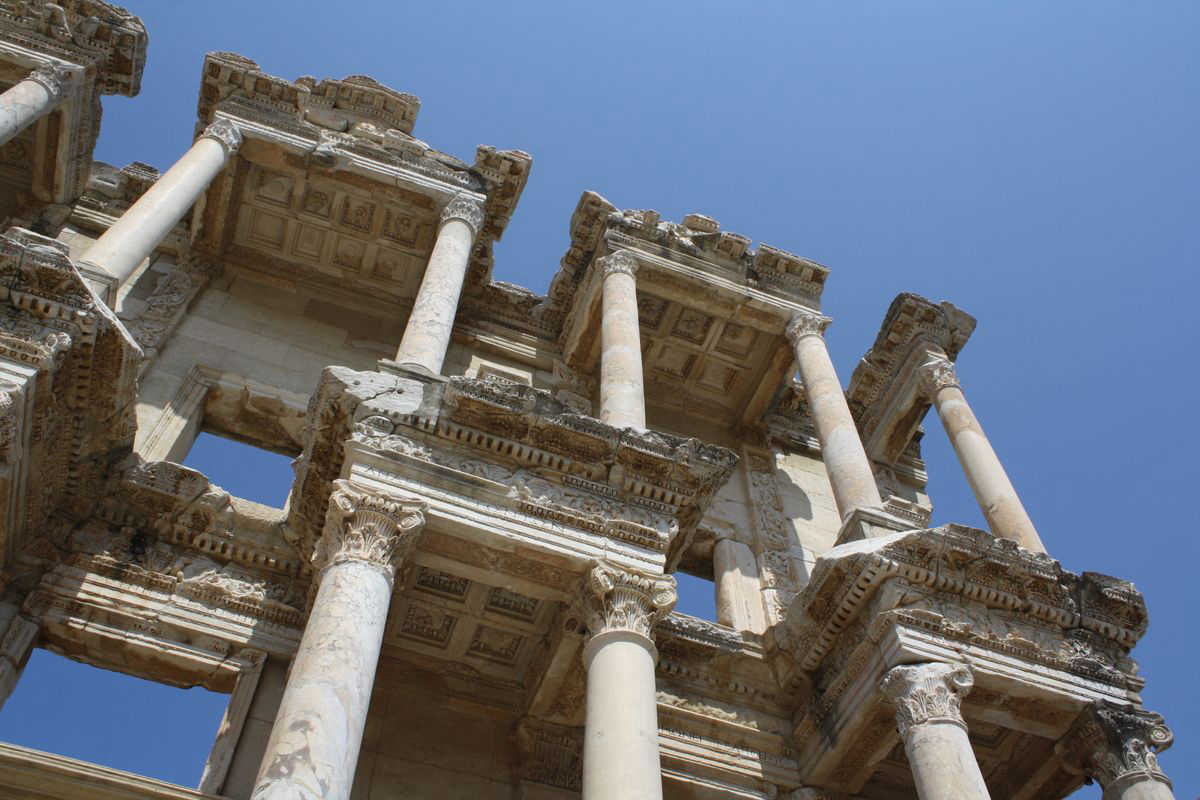The unrevealed secrets of the Library of Alexandria
Explore the enigmatic Library of Alexandria's history, its architectural wonder, mysterious demise, and enduring legacy in this insightful article.
- The Architectural Marvel and Cultural Hub
- Mysteries Shrouding the Library's Demise
- The Library's Influence on Modern Knowledge
- Artifacts and Insights: Glimpses into the Ancient World
- The Library's Lost Treasures and the Vatican Connection
- Conclusion
- Frequently Asked Questions
The Library of Alexandria, an emblem of knowledge and enlightenment, has fascinated historians and scholars for centuries. Established in the 3rd century BC, this repository of wisdom became the pinnacle of intellectual pursuit in the ancient world. Housing an extensive collection of scrolls and books, it was a beacon that attracted the era's greatest minds. Yet, its destruction remains one of history's most lamentable losses, leaving behind a shroud of mystery and a trail of unanswered questions. This article delves into the secrets and the enduring legacy of this iconic institution.
Key Takeaways
- The Library of Alexandria was a monumental center of learning, established by Ptolemy I in the 3rd century BC, and was home to a vast array of scholarly texts.
- It served as a cultural hub for intellectuals of the ancient world, where scholars congregated to study a diverse range of subjects.
- The true cause of the library's destruction is still debated, with multiple fires and invasions contributing to its demise over the centuries.
- Despite common myths, the Vatican Library, founded in the 15th century, does not contain manuscripts from the ancient Library of Alexandria.
- The modern Bibliotheca Alexandrina and the Greek and Roman Museum offer insights into the ancient world, continuing the legacy of the original library.
The Architectural Marvel and Cultural Hub

Design and Construction: Reflecting the Ptolemaic Dynasty's Vision
The Library of Alexandria, conceived under the reign of Ptolemy I, was not only a repository of knowledge but also a testament to the grandeur of the Ptolemaic Dynasty. Its design was intended to reflect the dynasty's vision of cultural supremacy and intellectual prowess. Boldly standing as a beacon of learning, the library was part of a larger complex that included the famous Lighthouse of Alexandria, one of the Seven Wonders of the Ancient World.
The construction of the library was a feat of architectural innovation, incorporating advanced techniques and materials of the time. The library's layout was meticulously planned to accommodate a vast collection of scrolls and provide a conducive environment for scholarly work.
- The library's main hall was designed to house thousands of scrolls.
- Private study rooms offered scholars a quiet retreat.
- Lecture halls facilitated the exchange of ideas among intellectuals.
The ambition behind the library's construction was not merely to amass knowledge but to create a center for learning that would endure through the ages.
While the exact details of the library's design remain a mystery, its influence is undeniable. It served as a blueprint for future centers of learning, setting a standard for libraries to come.
A Gathering Place for Intellectuals: The Scholars of Alexandria
The Library of Alexandria was not merely a repository of scrolls and books; it was a vibrant cultural hub that attracted the greatest minds of the ancient world. Scholars from diverse fields gathered here to engage in the pursuit of knowledge, sharing insights and contributing to the collective wisdom of the era.
Intellectuals of the time, including mathematicians, philosophers, and scientists, found in Alexandria a unique environment conducive to study, debate, and discovery. The library's role in fostering academic discourse cannot be overstated.
The convergence of scholars in Alexandria led to an unprecedented exchange of ideas, setting the stage for advancements that would shape future generations.
The following list highlights some of the renowned intellectuals associated with the Library of Alexandria:
- Euclid, the 'Father of Geometry'
- Archimedes, known for his work in physics and engineering
- Herophilus, a pioneer in the field of anatomy
- Eratosthenes, who calculated the Earth's circumference
This illustrious gathering of minds turned Alexandria into a beacon of enlightenment, its influence resonating through the corridors of history.
The Multifaceted Collections: Beyond Scrolls and Books
The Library of Alexandria was not merely a repository of scrolls; it was a treasure trove of the world's knowledge in various forms. Beyond the estimated half a million scrolls, the library boasted a wealth of artifacts, maps, and research instruments that were considered advanced for their time. The collection was a testament to the diversity of intellectual pursuits in the ancient world.
- Scrolls containing literature, science, philosophy, and more
- Artifacts representing the cultural and historical context of the works
- Maps and geographical charts aiding in exploration and understanding of the world
- Research tools and instruments reflecting the technological capabilities of the era
The library's collection was not static; it was an ever-evolving body of knowledge, meticulously curated and expanded upon by the scholars of Alexandria.
The significance of these collections cannot be overstated. They provided a foundation for scholarly work and were instrumental in the dissemination of knowledge across civilizations. The loss of such a comprehensive and varied collection is a void that historians and scholars still lament today.
Mysteries Shrouding the Library's Demise

The Fires That Burned History: Unraveling the Myths
The destruction of the Library of Alexandria is often recounted as a singular catastrophic event that obliterated centuries of knowledge in one fell swoop. This narrative, while dramatic, oversimplifies the complex history of the library's demise. In reality, the library likely experienced multiple incidents over time, each contributing to its gradual decline.
- Modern myth suggests that the Library was destroyed, along with its entire contents, in a single event. The truth is more complicated, however.
The idea that the Library vanished in a single blaze is a powerful image, but it is one that does not hold up under scrutiny. Instead, we must consider a series of events that chipped away at the library's existence.
The exact causes and timeline of these events remain a subject of debate among historians. Some point to the possible culprits and incidents that may have played a role in the library's downfall:
- Julius Caesar's civil war in 48 BCE, which led to fires in the harbor that may have spread to the library
- The attack by Emperor Aurelian during the siege of Alexandria in the 3rd century CE
- The decree of Theophilus in 391 CE, which targeted pagan temples
- The Muslim conquest of Alexandria in 642 CE, which some claim led to the final destruction of the library
Each of these events represents a piece of the puzzle, and only through careful examination can we hope to assemble a clearer picture of the library's fate.
Invasions and Disasters: Piecing Together the Timeline
The fate of the Library of Alexandria is a complex tapestry woven from various invasions and disasters. The library's destruction is often attributed to a single catastrophic event, but historical records suggest a series of calamities over centuries contributed to its demise.
- Julius Caesar's civil war in 48 BCE, where fires from the battle reportedly spread to the library
- The attack by Emperor Aurelian during the siege of Alexandria in the 3rd century CE
- The decree of Theophilus in 391 CE to destroy pagan temples, which may have included the library
- The Muslim conquest of Alexandria in 642 CE, where the library's fate is shrouded in legend
Each of these events may have played a role in the gradual decline of the Library of Alexandria, with invasions and internal strife leading to the loss of irreplaceable knowledge. The timeline of these events is still under scrutiny by historians, as they attempt to reconstruct the sequence that led to the library's end.
While the exact circumstances remain elusive, the impact of these losses on the cultural and intellectual heritage of humanity is undeniable.
The Quest for the True Location: Archaeological Pursuits
The search for the true location of the Library of Alexandria has been a tantalizing quest for historians and archaeologists alike. The Bibliotheca Alexandrina, a modern edifice inspired by the ancient library, stands as a cultural beacon on the Mediterranean shore, yet the original site remains elusive. Efforts to pinpoint the exact location have led to various theories, each supported by a mosaic of historical records and physical evidence.
- Recent excavations have unearthed structures that could be part of the ancient complex.
- Advanced technologies like ground-penetrating radar have been employed to scan beneath the city's modern landscape.
- Diverse artifacts discovered in the vicinity offer clues but no definitive answers.
The challenge lies not only in finding the library's remnants but also in interpreting the layers of history that have reshaped Alexandria over millennia.
While the subterranean discoveries in Transylvania and other archaeological puzzles around the world captivate our imagination, they also remind us of the vast knowledge that may have been housed within the walls of the Library of Alexandria. The quest continues, with each discovery adding a piece to the puzzle of our ancient past.
The Library's Influence on Modern Knowledge

Lost Wisdom: Estimating the Impact on Contemporary Science
The Library of Alexandria was not merely a repository of scrolls and books; it was a crucible of ancient knowledge and wisdom. The loss of its contents has left a void in our understanding of the ancient world, and by extension, the foundations of contemporary science. The library's destruction is often lamented as a 'catastrophe for the history of scientific thought,' with the potential loss of works by great thinkers such as Euclid, Archimedes, and others.
The true extent of what was lost remains a subject of speculation, but it is clear that the library held many texts that are now known only by name, or through references in other works. Here are some key areas where the loss has been felt most acutely:
- Advances in mathematics and geometry
- Early developments in astronomy and engineering
- Writings on medicine and anatomy
- Philosophical works that shaped early thought
The ripple effects of this knowledge gap are profound, influencing not just historical understanding, but the trajectory of scientific progress itself.
While we can never fully quantify the impact of the library's disappearance on modern science, we can acknowledge the magnitude of its influence. The library was a beacon of learning that attracted scholars from across the known world, and its loss signifies more than just the disappearance of texts—it represents the extinguishing of the era's brightest light of knowledge and inquiry.
Echoes in Modern Libraries: The Legacy of Alexandria's Scholarship
The Library of Alexandria was not just a repository of scrolls and books; it was a crucible for the intellectual and cultural development that has shaped modern libraries. The principles of knowledge collection, categorization, and preservation that were honed in Alexandria can be seen in the libraries of today. These institutions continue to serve as hubs for learning, much like their ancient predecessor.
- The Library of Alexandria set a precedent for public access to knowledge.
- It fostered a collaborative environment for scholars to exchange ideas.
- The concept of a universal library, aiming to house all human knowledge, is a direct descendant of Alexandria's ambition.
The legacy of Alexandria's scholarship is a testament to the enduring value of knowledge and the human quest for understanding.
While the physical structure of the Library of Alexandria is long gone, its spirit endures in the ethos of modern libraries. They remain committed to the democratization of knowledge, providing resources and services that empower individuals and communities.
The Misconceptions: Separating Fact from Fiction in Popular Culture
The Great Library of Alexandria continues to captivate the imagination, often serving as a backdrop for tales of intrigue and repositories of forbidden knowledge in popular culture. However, the line between the mythical and the historical library has often been blurred. The myth versus reality debate is a testament to the library's enduring mystique, but it also leads to misconceptions about its true nature and legacy.
In the realm of fiction, libraries are frequently depicted as silent sanctuaries guarded by stern librarians. This stereotype has been challenged and reshaped in recent years, with a more diverse portrayal of library professionals and settings. From the animated series that celebrate the librarian's role to films that explore the library as a dynamic space, the narrative is slowly shifting.
The portrayal of libraries in popular culture is not just about the setting, but also about the people who animate them. The evolving depiction reflects a broader understanding of the library's role in society.
To illustrate the changing perceptions, consider the following list of topics discussed in recent pop culture reviews:
- Librarians as agents of change and power
- The library as a place of community and connection
- Challenging the 'shusher' librarian stereotype
- Fictional libraries as magical and mysterious spaces
- The representation of librarians of color in media
While these discussions are a step towards a more accurate representation, they also highlight the need for ongoing dialogue to separate the fantastical from the factual.
Artifacts and Insights: Glimpses into the Ancient World

Deciphering the Past: The Role of Artifacts in Understanding History
Artifacts serve as a bridge to the past, offering a tangible connection to the lives and cultures of ancient civilizations. Artifacts can be an important complement to text-based primary sources because they provide a concrete dimension to our understanding of history. An artifact remains as a witness to the time it was created, often outlasting the written records that may have accompanied it.
The discovery of artifacts, from the Mighty Viking Harald Hardrada's weaponry to the intricate jewelry of Stone Age Europe, reveals the diversity and complexity of past societies. Each object holds a story, waiting to be uncovered by archaeologists and historians. The following list highlights some of the recent significant finds:
- 1,000-Year-Old Church Walls Unearthed In Ethiopia
- Curious Ice Age Figurine Of Unidentified Animal Species
- John Dee's Magical Mirror Traced To The Aztecs
- Use Of Tobacco Pipes By Hopewell People
- Ancient Egyptian Toys And Games
The study of these artifacts not only enriches our knowledge of history but also informs our understanding of human development and cultural evolution over millennia.
The Greek and Roman Museum: A Portal to Antiquity
The newly opened Greek and Roman Museum in Alexandria serves as a bridge to the past, presenting a tapestry of historical narratives through its extensive collection of artifacts. Visitors are transported to the heart of ancient civilizations, experiencing the grandeur of Greek and Roman cultures firsthand.
- Exploring artifacts: Delve into the essence of Greek and Roman history.
- Underground tombs: Unearth the secrets of the Catacombs of Kom El Shokafa.
- Montazah Gardens: Experience the tranquility of the royal gardens.
The museum not only showcases the splendor of ancient artifacts but also offers a unique opportunity to understand the interconnectedness of these civilizations with Egypt's own rich heritage.
The journey from Cairo to Alexandria is a testament to the enduring legacy of these cultures. The artifacts on display are not mere relics; they are keys to unlocking the mysteries of an era that laid the foundations for much of our modern world. The Montazah Palace Gardens complement this historical exploration, providing a serene backdrop that once delighted royalty.
The Modern Bibliotheca Alexandrina: Continuation of a Legacy
The Bibliotheca Alexandrina stands as a modern tribute to the ancient Library of Alexandria, seeking to recapture the spirit of openness and scholarship that once flourished in classical times. This contemporary institution embodies the aspirations of a new era, aiming to bridge the gap between Egypt's rich past and its promising future.
Inspired by its historic predecessor, the modern library boasts a collection of over 8 million books, providing a vast reservoir of knowledge to scholars and the public alike. It serves as a beacon of learning, culture, and dialogue in the Mediterranean region.
The Bibliotheca Alexandrina is not just a library; it is a complex of museums, galleries, and research centers, all dedicated to the pursuit of knowledge and the preservation of human heritage.
The library's design reflects a blend of ancient traditions and cutting-edge technology, symbolizing the continuity of the quest for knowledge across the ages. It is a testament to the enduring legacy of the Library of Alexandria and its impact on the world.
The Library's Lost Treasures and the Vatican Connection

The Vatican Archives: Debunking the Myths of Hidden Scrolls
The allure of the Vatican's secretive archives has given rise to numerous legends, particularly the belief that they house ancient scrolls from the fabled Library of Alexandria. However, historical evidence dispels these myths. The Vatican Library, officially founded in 1475, came into existence long after the destruction of the Library of Alexandria, making it impossible for the original Alexandrian manuscripts to be part of its collection.
The Vatican Library's foundation aligns with the Renaissance period, a time when the Church sought to consolidate religious texts rather than ancient Greek or Egyptian works. The library's establishment was part of a broader cultural movement rather than a secretive hoarding of lost knowledge.
Despite the romanticized tales, the Vatican's archives are not a hidden repository of ancient wisdom but a reflection of the Church's historical journey.
While the archives do contain a wealth of historical documents, they are primarily related to the Church's history and not the ancient civilizations of Greece or Egypt. The following points clarify the library's actual contents:
- Unique documents and religious manuscripts pertinent to the history of the Church.
- Records of papal correspondence and administrative documents.
- A collection of printed books and manuscripts acquired since the 15th century.
The Literary Treasure Hunt: From Alexandria to Rome
The quest to trace the lineage of knowledge from the great Library of Alexandria to the heart of Rome is a narrative woven with intrigue and scholarly dedication. The transfer of wisdom across the Mediterranean is a testament to the enduring legacy of Alexandria's intellectual prowess. The journey of manuscripts and scrolls, often shrouded in mystery, reflects a broader cultural exchange that shaped the foundations of Western civilization.
The dissemination of Alexandria's treasures was not a singular event but a series of complex interactions involving trade, conquest, and scholarly pursuits. The following list highlights key aspects of this historical odyssey:
- The role of traders and scholars in the spread of knowledge
- The influence of Roman conquests on the acquisition of texts
- The preservation efforts by early Christian and Islamic scholars
The paths of ancient texts are as labyrinthine as the streets of Alexandria itself, each turn revealing a new chapter in the story of human knowledge.
While much of the Library's original collection has been lost to time, the impact of its intellectual heritage continues to resonate throughout history. The Vatican Library, often at the center of speculation regarding the fate of Alexandria's lost works, stands as a symbol of the enduring quest for knowledge and the preservation of history.
The Influence of Alexandria's Knowledge Across Civilizations
The Library of Alexandria was not merely a repository of scrolls and books; it was the intellectual capital of the ancient world. Scholars from diverse backgrounds converged here, sharing and expanding the collective human understanding. This cross-pollination of ideas laid the groundwork for advancements in various fields, influencing civilizations long after the library's demise.
- The library's emphasis on knowledge and learning inspired similar institutions around the world.
- Its scholars' works were disseminated, forming the basis of educational curricula in Europe and Asia.
- The translation and preservation of texts by the library's academics ensured that the wisdom of the ancients was not lost to time.
The legacy of Alexandria's library is a testament to the enduring power of knowledge and its ability to transcend borders and epochs.
The echoes of Alexandria's scholarly pursuits can still be felt today, as modern institutions strive to emulate its spirit of inquiry and openness. The city's hidden treasures and the enduring allure of its intellectual heritage continue to captivate scholars and history enthusiasts alike.
Conclusion
The Library of Alexandria remains an emblem of ancient knowledge and a symbol of cultural loss that continues to fascinate and haunt the modern world. Despite the many fires, invasions, and the passage of time that have obscured its true contents and location, the library's legacy endures through the artifacts, stories, and scholarly pursuits it inspired. As we reflect on the fragments of history and the echoes of the past, we are reminded of the profound impact that this center of learning had on civilization. The secrets of the Library of Alexandria may never be fully revealed, but its spirit lives on, urging us to seek wisdom and preserve the treasures of human thought for future generations.
Frequently Asked Questions
What was the Library of Alexandria?
Established in the 3rd century BC by Ptolemy I, the Library of Alexandria was a monumental center of learning and culture in the ancient world. It housed hundreds of thousands of scrolls and books, covering various fields of knowledge, including philosophy, mathematics, astronomy, medicine, and literature.
Did the Library of Alexandria influence modern libraries?
Yes, the Library of Alexandria is considered a precursor to modern libraries due to its role as a cultural and intellectual hub. Its legacy of scholarship and collection of knowledge laid the groundwork for the institutions we recognize today as libraries.
Are there any surviving manuscripts from the Library of Alexandria in the Vatican Archives?
Contrary to popular belief, the Vatican Library, established in the 15th century, does not possess ancient manuscripts from the Library of Alexandria. The claims that it holds the entire literary treasure of the ancient world are myths.
What happened to the Library of Alexandria?
The library faced several fires and invasions over the centuries, leading to its destruction. The exact circumstances of its demise, its location, and the full extent of its contents remain uncertain, making it one of the greatest mysteries in the history of civilization.
Can visitors explore artifacts related to the Library of Alexandria today?
Yes, visitors can explore artifacts from the Greek and Roman periods at the Greek and Roman Museum in Alexandria, which offers insights into the ancient world and may include items related to the historical era of the Library of Alexandria.
Is there a modern equivalent to the Library of Alexandria?
The modern Bibliotheca Alexandrina, located in Alexandria, Egypt, serves as a tribute to the ancient library. It aims to recapture the spirit of openness and scholarship of the original library and houses an impressive collection of books and manuscripts.



Poster un commentaire